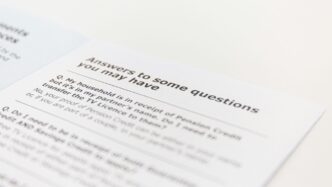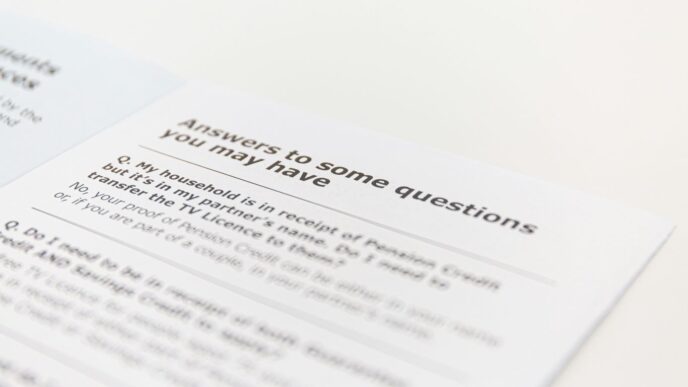Starting your career can feel like a big step, and the interview process is a huge part of that. For freshers, HR interviews are often the first hurdle. They want to see if you’re a good fit for the company culture and the role. To help you out, we’ve put together a list of the top 10 HR interview questions and answers for freshers. Getting these right can make a big difference in landing that first job.
Key Takeaways
- Prepare concise answers for ‘Tell Me About Yourself’ that highlight your background and relevant skills.
- When discussing strengths, connect them directly to the job requirements.
- For weaknesses, choose something minor and explain how you’re working to improve it.
- Research the company and role thoroughly to explain why you applied.
- Be ready to discuss your ideal work environment and how it helps you be productive.
Tell Me About Yourself

This is your moment to make a solid first impression, so don’t just ramble. Think of it as a quick introduction, like a professional elevator pitch. Start with your name and a brief mention of your academic background or recent graduation. For example, you could say, "My name is [Your Name], and I recently graduated with a degree in [Your Major] from [Your University]."
Next, highlight a couple of key skills or qualities that are relevant to the job. Are you a quick learner? Do you work well with others? Maybe you’re really organized. It’s important to connect these traits to what the company is looking for. For instance, if the job requires teamwork, mention your experience collaborating on projects. If it’s a fast-paced environment, talk about how you handle multiple tasks.
Here’s a quick way to structure it:
- Introduction: Name, education, and maybe where you’re from.
- Relevant Skills/Qualities: Two or three key strengths that match the job description.
- Enthusiasm: Express your interest in the role and the company.
Don’t forget to mention why you’re excited about this specific opportunity. Showing genuine interest goes a long way. You can also briefly touch on a hobby or interest if it shows a well-rounded personality, but keep the focus professional. The goal is to give the interviewer a clear, concise picture of who you are and why you’re a good fit for this role.
What Are Your Strengths
When they ask about your strengths, it’s your chance to show them what you bring to the table. Think about what you’re genuinely good at and, more importantly, how those skills can help the company. Don’t just list generic traits; try to connect them directly to the job you’re applying for. It’s like showing them you’ve got the right tool for the job before they even ask you to use it.
For example, if the job involves a lot of teamwork, you might talk about your ability to collaborate effectively. Maybe you’re really good at organizing things, which helps you manage your time and get tasks done without missing deadlines. Or perhaps you’re a quick learner, always ready to pick up new software or processes.
Here are a few common strengths that often come up, and how you might think about them:
- Problem-Solving: This means you can look at a tricky situation, figure out what’s going wrong, and come up with a sensible solution. It’s not just about finding problems, but fixing them.
- Communication: Being able to explain things clearly, whether you’re talking to someone or writing an email, is super important. It helps avoid misunderstandings and keeps everyone on the same page.
- Adaptability: The workplace can change quickly. Being adaptable means you can roll with those changes, learn new ways of doing things, and stay productive even when things are a bit up in the air.
- Time Management: This is all about getting things done when they need to be done. It involves prioritizing tasks, not getting sidetracked, and making sure you meet your deadlines without feeling overwhelmed.
The key is to back up your claims with a quick example. Instead of just saying ‘I’m organized,’ you could say, ‘I’m very organized. In my last project, I created a detailed spreadsheet to track all our tasks, which helped us finish two days ahead of schedule.’ It makes your strengths feel real and shows you can actually use them.
What Are Your Weaknesses
This question can feel like a trap, right? Like they’re just waiting for you to slip up. But honestly, it’s more about seeing if you’re self-aware and willing to grow. Nobody’s perfect, and pretending you are just makes you seem out of touch.
When I think about areas where I’m still developing, one thing that comes to mind is my tendency to get really focused on the details. Sometimes, I can spend a bit too much time making sure every tiny aspect is just right, which can slow things down. I’m actively working on this by setting specific time limits for tasks and reminding myself to step back and look at the bigger picture more often. It’s a balancing act, for sure.
Another area is public speaking. While I’m comfortable talking in small groups, presenting to a large audience used to make my palms sweat. To tackle this, I joined a local Toastmasters group a while back. It’s been incredibly helpful for building confidence and learning techniques to manage nerves. I’ve seen a big improvement already, and I’m committed to continuing that practice.
Finally, I’m learning to delegate more effectively. In past group projects, I sometimes found myself taking on too much because I wanted to ensure it was done a certain way. I’ve realized that trusting my teammates and distributing tasks allows everyone to contribute their best and often leads to a better overall outcome. It’s about recognizing that collaboration is key, not just doing it all yourself.
Why Did You Decide to Apply to This Role
This is a big one, and honestly, it’s your chance to show you’ve done your homework and aren’t just sending out resumes into the void. Think about what specifically about this job caught your eye. Was it a particular project mentioned in the description? A skill you’re eager to develop? Maybe the company’s mission aligns with your own values.
For example, you could say something like:
- "I was really drawn to the opportunity to work on [specific project or technology] because it directly relates to my coursework in [relevant subject] and I’m excited to apply what I’ve learned."
- "The job description mentioned [specific responsibility], which is something I’ve been actively looking to gain more experience in since my internship at [previous company]."
- "I’ve been following [Company Name]’s work in [industry/area] for a while now, and I’m particularly impressed with [specific product or initiative]. The chance to contribute to that kind of innovation is really appealing."
It’s not just about what the job can do for you, but also how your skills and interests fit what they’re looking for. Showing genuine enthusiasm and a clear connection between your aspirations and the role is key. It demonstrates that you’ve thought this through and aren’t just looking for any job, but this job. You can find some great tips on how to approach this question effectively here.
Think about it this way: they want to hire someone who is motivated and will stick around because they actually want to be there. So, be specific, be honest, and connect your personal goals with the company’s needs. It shows you’re thoughtful and serious about your career path.
What Do You Know About Our Company’s Product/Services
So, you want to know what I know about what your company actually makes or does? I’ve spent some time looking into it, and it seems pretty interesting.
From what I’ve gathered, your main focus is on [mention specific product/service category, e.g., developing innovative software solutions for small businesses]. I noticed you recently launched [mention a specific recent product or feature, e.g., the new ‘ProjectFlow’ management tool], which looks like it addresses a real need for better team coordination. It’s cool to see how you’re trying to make things easier for people.
I also saw that you offer [mention another product/service or aspect, e.g., consulting services for digital transformation]. This shows a broader approach to helping clients, not just selling them a product. It suggests you’re thinking about the whole picture for your customers.
I’m particularly impressed by your commitment to [mention a company value or mission, e.g., sustainability in your manufacturing process]. It’s not something every company talks about, and it tells me you’re thinking beyond just the bottom line. I also checked out some of the customer feedback, and people seem to really appreciate the [mention a specific positive aspect, e.g., reliability of your equipment or the responsiveness of your support team]. It’s clear you’ve put thought into creating something that people find genuinely useful. I’m excited about the possibility of contributing to a company that’s making a tangible impact. I even found some great resources on business name registration that made me think about how important it is for companies like yours to have a solid foundation.
Describe the Workplace Where You’ll Be Most Happy and Productive

When I think about a place where I can really do my best work, a few things come to mind. First off, I really appreciate environments where people feel comfortable sharing ideas and giving feedback. It’s not just about having an open door policy, but more about a genuine feeling that everyone’s input is heard and considered. I thrive when there’s a sense of teamwork and mutual respect.
I also find that I’m most productive when there’s a good balance between focused work time and opportunities for collaboration. It’s helpful to have clear goals and expectations, but also the flexibility to approach tasks in a way that makes sense for me. A workplace that supports professional growth through training and development is also a big plus. Learning new things and improving my skills keeps me engaged and motivated.
Here’s what I look for:
- Clear Communication: Knowing what’s expected and getting regular updates helps a lot.
- Supportive Colleagues: People who are willing to help each other out and share knowledge.
- Opportunities to Learn: Access to training or chances to take on new challenges.
- A Positive Atmosphere: A place where people generally seem happy to be there and work together.
Ultimately, I want to be part of a team where I can contribute meaningfully and feel like I’m growing. It’s about finding that sweet spot where the work is engaging, the people are great, and there’s a shared drive towards success. I’ve found that companies that focus on employee well-being often have this kind of atmosphere.
Why Did You Leave Your Last Job
This is a question that can feel a little tricky, but it’s really about understanding your career progression and what you’re looking for next. The key is to be honest but always professional and positive.
Think about your last role. What did you learn? What were the good parts? Even if things weren’t perfect, focus on the growth you experienced. Maybe you’ve learned all you can in that specific position and are ready for new challenges. Perhaps you’re looking for a role that offers more opportunities to develop a particular skill set, or you’re seeking a different kind of work environment. It’s perfectly fine to want a change that aligns better with your long-term goals. For instance, you might say:
- "I gained a lot of experience in [specific skill] at my last job, and I’m really grateful for that. Now, I’m eager to find a role where I can apply those skills while also developing my abilities in [new skill area]."
- "My previous role was a great stepping stone, and I learned so much about [industry/process]. However, I’m now looking for an opportunity that offers more direct involvement in [specific aspect of the new role]."
- "I’m seeking a company culture that is more focused on [desired aspect, e.g., collaboration, innovation], which I believe aligns with my own working style and aspirations."
It’s also a good time to mention if you’re looking for a role that offers a better work-life balance or a chance to advance your career path. The goal is to show that you’re proactive about your professional development and that this new opportunity is a logical next step for you. You want to convey that you’re moving towards something better, not just running away from something negative. Remember, employers want to see that you’re motivated and have a clear vision for your future, and that this role fits into that picture. You can find more information on valid reasons for leaving a job here.
Avoid speaking negatively about former employers, colleagues, or the company itself. Instead, frame your departure as a positive move towards growth and new opportunities.
How Do You Handle Stress, Pressure, and Anxiety
Okay, so everyone feels the heat sometimes, right? When things get hectic, I try to take a step back for a second. My go-to is usually to break down whatever is causing the stress into smaller, manageable pieces. It sounds simple, but it really helps. Instead of looking at one giant, overwhelming task, I focus on just the next small step.
I also find that staying organized helps a lot. When my to-do list is clear and I know what needs to be done, it’s easier to stay calm. If I’m feeling really swamped, I might take a quick walk or just do a few deep breaths. It’s amazing what a few minutes of quiet can do to reset your mind.
Here’s a little system I use:
- Identify the Stressor: What exactly is making me feel this way? Is it a deadline, a difficult task, or something else?
- Prioritize: What absolutely needs to be done now, and what can wait?
- Action Plan: What’s the very next step I can take to move forward?
- Self-Care: Don’t forget to take short breaks. A quick stretch or a glass of water can make a difference.
I’ve found that having a plan, even a simple one, makes a big difference. It’s not about never feeling stressed, but about having ways to deal with it so it doesn’t get the best of you.
Where Do You See Yourself in Five Years
This is a classic interview question, and it’s your chance to show you’ve thought about your future and how this role fits into that picture. Instead of just saying you want to be a manager or climb the ladder, try to be a bit more specific about your growth. I’m looking to build a solid foundation in this field and become proficient in the core responsibilities of this position.
Think about what you want to learn and achieve. Maybe you want to master certain skills, take on more complex projects, or even contribute to specific company goals. It’s also a good idea to show that you’re interested in growing with the company. For example, you could say:
- I hope to have a strong grasp of [mention a key skill or area relevant to the job].
- I’d like to be contributing to projects that have a real impact on [mention a company goal or product area].
- I’m eager to take advantage of any training opportunities to expand my knowledge in [mention a relevant field].
It’s not about having your entire career mapped out, but showing ambition and a willingness to develop. You can also mention how you see yourself contributing to the team’s success. For instance, you might aim to be a go-to person for certain tasks or mentor newer team members down the line. The key is to align your personal aspirations with the opportunities the company can provide, demonstrating that you’re thinking long-term about your career path and how it connects to the company’s mission.
What Makes You Most Qualified for This Position
That’s a great question. When I look at the requirements for this role, I see a lot of overlap with what I’ve learned and what I’ve actually done.
During my studies, I focused on [mention relevant coursework or projects]. For example, in my [specific class/project name] class, we worked on [briefly describe project and your role], which gave me hands-on experience with [mention specific skills like data analysis, coding languages, research methods, etc.]. I also completed an internship at [previous company, if applicable] where I was responsible for [mention 1-2 key responsibilities that align with the job].
Here’s a quick rundown of how my background fits:
- Skills: I’ve developed a solid foundation in [Skill 1], [Skill 2], and [Skill 3], all of which are listed as important for this position. I’m also comfortable using [Software/Tool 1] and [Software/Tool 2].
- Experience: My project work and any previous roles have prepared me to handle tasks like [Task 1] and [Task 2]. I’m used to working in team settings and meeting deadlines.
- Attitude: I’m a quick learner and I’m really eager to apply what I know and pick up new things. I’m not afraid to ask questions when I need to, and I’m committed to doing good work.
I believe my combination of practical skills, academic background, and a genuine enthusiasm for this type of work makes me a strong candidate. I’m confident I can step in and start contributing effectively pretty quickly.
Wrapping Up
So, you’ve gone through some of the most common questions HR might throw your way as a fresher. Remember, the goal isn’t just to have the ‘right’ answers, but to show who you are and why you’d be a good fit. Practice these out loud, maybe even with a friend. It might feel a little awkward at first, but it really helps. Being prepared makes a huge difference, and it’ll definitely boost your confidence when you walk into that interview room. Good luck out there!
Frequently Asked Questions
How can I tell the interviewer about myself?
Start by saying your name and a little about your background, like where you’re from or what you studied. Then, mention a few good things about yourself that would help you do well in the job, like being good at teamwork or learning quickly. Also, share some skills you have that match what the job needs. It’s nice to add a quick mention of a hobby to show you’re a real person. Finish by saying you’re excited about the job.
What are my best qualities?
Think about what you’re good at that will help you at work. Are you a good listener? Do you work well with others? Are you always on time and ready to learn? Pick a few of these and give a short example of when you showed that quality. For example, ‘I’m a good problem-solver. In a school project, we had a problem, and I came up with a solution that helped us finish on time.’
What are my not-so-good qualities?
It’s okay to have things you’re still working on. Pick something small that won’t hurt you in this job. For instance, you could say, ‘Sometimes I get so focused on making sure something is perfect that I might take a little longer than needed.’ Then, add how you’re trying to get better, like, ‘But I’m learning to manage my time better to balance quality and speed.’
Why do I want this specific job?
Show that you didn’t just apply everywhere. Mention something specific you like about the job or the company. Maybe you admire their products, or you think the work they do is interesting. Connect it to your own goals and skills. For example, ‘I’ve been following your company’s work in [area] and I’m really impressed. This role seems like a great chance to use my skills in [skill] and learn even more.’
What do I know about the company’s products or services?
Do a little homework! Look at the company’s website. What do they make or do? What makes them special? You don’t need to be an expert, but showing you know the basics and are interested is key. You could say, ‘I know your company makes [product/service] and I’ve heard good things about how [mention a positive aspect].’
What kind of place helps me do my best work?
Think about what makes you feel happy and productive. Do you like working with a team or more on your own? Do you prefer a quiet space or a busy one? Describe a place where you can focus, learn, and feel like you’re contributing. For example, ‘I do my best work in an environment where people support each other and are open to new ideas. I like having clear tasks but also the freedom to figure out the best way to do them.’














